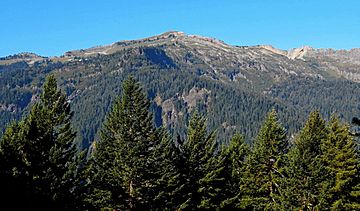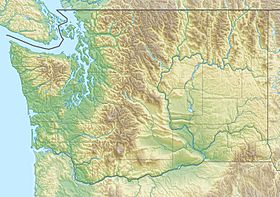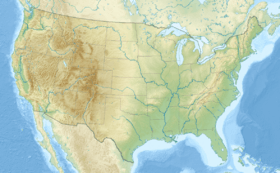Tatoosh Peak facts for kids
Quick facts for kids Tatoosh Peak |
|
|---|---|

East aspect
|
|
| Highest point | |
| Elevation | 6,310 ft (1,920 m) |
| Prominence | 950 ft (290 m) |
| Geography | |
| Location | Lewis County, Washington, U.S. |
| Parent range | Cascades |
| Topo map | USGS Tatoosh Lakes |
| Climbing | |
| Easiest route | Hiking |
Tatoosh Peak is a mountain peak. It is part of the Tatoosh Range. This range is a smaller part of the larger Cascade Range. Tatoosh Peak is the highest point in the Tatoosh Wilderness. This is a special protected area. The Gifford Pinchot National Forest takes care of it.
The name Tatoosh comes from an old language called Chinook Jargon. It means 'breast'. Rain and melted snow from the peak flow into streams. These streams then join the Cowlitz River.
Mountain Weather
Tatoosh Peak is in a place with a 'marine west coast' climate. This means it's near the ocean. Most weather systems come from the Pacific Ocean. They travel northeast towards the Cascade Mountains.
When these weather systems hit the tall Cascade Mountains, they are forced to rise. As the air goes up, it cools down. This causes the moisture in the air to turn into rain or snow. This is why the west side of the Cascades gets a lot of rain and snow.
During winter, there is often heavy snowfall. Because of the ocean's influence, the snow is usually wet and heavy. This can make the risk of avalanches higher. In summer, high pressure systems over the Pacific Ocean often bring clear skies.
History of Tatoosh Peak
In 1932, a special building was put on Tatoosh Peak. It was a fire lookout. People used it to watch for forest fires.
A writer named Martha Hardy worked at this fire lookout. She wrote a book about her experiences there. The book was called Tatoosh and came out in 1947.
Hiking to the Peak
You can reach Tatoosh Peak by hiking. The main path is called the Tatoosh Trail (#161). It starts from the south side of the peak.
There is also a short path called spur trail (#161A). This path leads to where the old fire lookout used to be. Only the foundations of the building are left now.
Images for kids
 | Kyle Baker |
 | Joseph Yoakum |
 | Laura Wheeler Waring |
 | Henry Ossawa Tanner |





